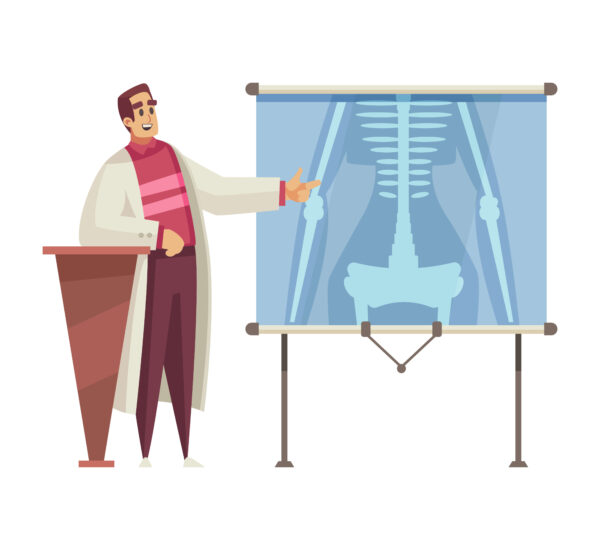Dealing with the impact of osteoporosis during the age of 50 and above can be challenging. During this stage, individuals need to have a go-to medication or treatment for better management of their bone health. Fortunately, bisphosphonates can provide the relief that patients are looking for.
For those who don’t know how bisphosphonates can help with osteoporosis management, this blog is for you. Discover an in-depth discussion about this medication for osteoporosis. By understanding the science behind these medications, their efficacy, and potential side effects, patients can harness the power of this medication in managing this debilitating bone disease.
Let’s begin!
Understanding Osteoporosis

Osteoporosis is a complex and multifaceted bone disease that affects millions of individuals worldwide. It is characterized by low bone density and mass due to low calcium levels. Thus, leading to a heightened risk of fractures, especially in the spine, hip, and wrist.
At its core, osteoporosis is a silent thief, robbing individuals of their bone strength and resilience without warning. The condition arises when the delicate balance between bone formation and breakdown is disrupted, leading to a gradual deterioration of bone tissue. This insidious process can go unnoticed for years until a sudden fracture is a stark wake-up call, underscoring the importance of proactive bone health management.
The Role of Bones in Human Health
Bones are engineering marvels, providing the body with structural integrity, protection for vital organs, and the ability to move and carry out daily activities. Beyond mechanical functions, bones also act as a mineral reservoir, storing crucial elements like calcium and phosphorus. These minerals are vital in muscle function, nerve transmission, and overall metabolic processes.
Risk Factors and Symptoms of Osteoporosis
Various factors contribute to the development of osteoporosis, with age and gender playing significant roles. Women, especially postmenopausal women, are at a higher risk due to hormonal changes that affect bone density. Additionally, a sedentary lifestyle, smoking, excessive alcohol consumption, and certain medical conditions can exacerbate the progression of osteoporosis.
Recognizing the subtle signs of osteoporosis, such as loss of height, back pain, and easily occurring fractures, is crucial for identifying the occurrence of osteoporosis. When these signs are present, timely intervention is a must to prevent further bone deterioration. That’s where bisphosphonates are usually introduced by the doctors to patients with osteoporosis.
What is Bisphosphonates

When delving into the realm of osteoporosis treatment, the spotlight often falls on bisphosphonates, a class of medications designed to slow down bone loss and reduce fracture risk. Bisphosphonate treatment works by inhibiting the activity of osteoclasts, cells responsible for breaking down bone tissue. By targeting osteoclasts, bisphosphonates help to rebalance bone turnover and promote bone strength, ultimately reducing the risk of fractures in individuals with osteoporosis. In short, these medications have revolutionized the management and treatment of osteoporosis by targeting the underlying mechanism of bone loss.
The Science Behind Bisphosphonates
Bisphosphonates are synthetic analogs of pyrophosphate, a natural compound that regulates bone metabolism. Once ingested, these medications bind to hydroxyapatite crystals within the bone, where they inhibit osteoclast-mediated bone resorption, ultimately leading to increased bone mineral density.
Furthermore, bisphosphonates have been shown to have additional benefits beyond their anti-resorptive effects. Some studies suggest that bisphosphonates may also have anti-inflammatory properties, potentially contributing to their overall positive impact on bone health.
Different Types of Bisphosphonates
There are two main types of bisphosphonates that doctors for osteoporosis commonly prescribe to patients. Let’s discuss their differences below!
Oral Bisphosphonates

This type is taken orally by patients with osteoporosis. Unfortunately, there are records showing that this type of medication can cause side effects such as heartburn. That’s why it is important to follow the specific instructions of the doctor when taking this medication. The medications under this category involve alendronate, risedronate, and ibandronate.
After oral administration, bisphosphonates are poorly absorbed in the gastrointestinal tract. To improve absorption, it is crucial to take these medications on an empty stomach, with plain water, and to remain upright for at least 30 minutes afterward, as food and other beverages can interfere with their absorption. Additionally, bisphosphonates are not metabolized by the liver and are excreted primarily through the kidneys.
Intravenous Bisphosphonates

On the other hand, intravenous bisphosphonates is a type of medication for osteoporosis that is administered to the patient’s veins. It is the chosen treatment method if the patient experiences constant side effects when taking them orally. In terms of this bisphosphonate therapy, there are certain recommended doses depending on the kind of IV used. It’s best to follow the doctor’s instructions to ensure effective results. Common forms of IV are pamidronate, zoledronate, and ibandronate.
The Efficacy of Bisphosphonates in Osteoporosis Treatment
Bisphosphonates have been extensively studied and shown to be highly effective in reducing the risk of fractures and improving bone density in individuals with osteoporosis. Multiple clinical trials have demonstrated the efficacy of bisphosphonates in reducing the incidence of fractures, including vertebral, hip, and non-vertebral fractures. These medications have also been shown to improve bone mineral density, further solidifying their role in osteoporosis treatment.
Moreover, some studies have indicated that bisphosphonates may have additional benefits beyond their effects on bone health. For example, there is emerging research suggesting a potential link between bisphosphonate use and a reduced risk of certain types of cancer, though more research is needed to confirm this association.
Long-Term Effects and Benefits
Long-term treatment with bisphosphonates has been associated with a sustained reduction in fracture risk, even after discontinuation of therapy. These medications have been shown to provide long-lasting benefits, making them an important component of osteoporosis management.
Furthermore, ongoing studies are exploring the role of bisphosphonates in preventing osteoporosis-related complications, such as kyphosis and loss of height. Early findings suggest that these medications may help mitigate these issues, highlighting their potential for improving overall quality of life in individuals with osteoporosis.
Potential Side Effects and Risks of Bisphosphonates
As mentioned, there are certain side effects when it comes to ingesting this medication for osteoporosis. Understanding these nuances can help healthcare providers and patients make informed decisions.
Common Side Effects
Common side effects of bisphosphonates include gastrointestinal symptoms like heartburn and indigestion, musculoskeletal pain, and flu-like symptoms. These side effects are usually mild and transient, but it is important to report them to a healthcare provider if they persist or worsen.
In rare cases, prolonged use of bisphosphonates has been associated with rare but serious complications, such as atypical femur fractures and osteonecrosis of the jaw. However, the overall benefits outweigh these risks, especially for individuals at high risk of fractures.
Final Takeaway
While bisphosphonates may have potential side effects and risks, these are manageable, and the overall benefits outweigh the risks for most patients. As always, it is important to consult with a knowledgeable healthcare provider to determine the most appropriate treatment approach for individual patients.
So, if you need bisphosphonates to manage your osteoporosis better, don’t hesitate to ask for help. Book an online consultation or visit a local health center to meet with a rheumatologist today!
Bisphosphonates Knowledge Check
Test what you learned about bisphosphonates and osteoporosis



